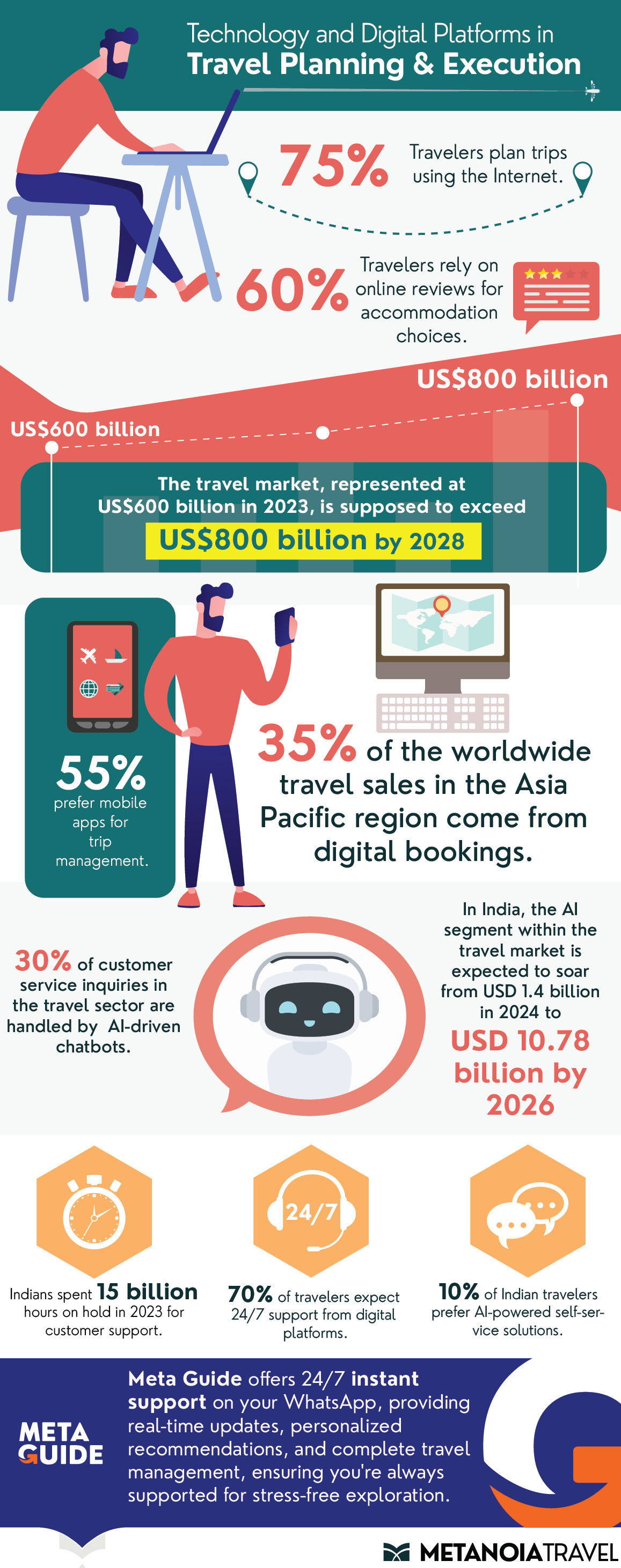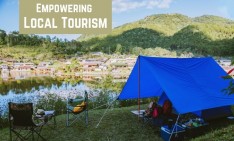Technology is continuously pushing the travel industry to higher delivery standards by offering unprecedented convenience and a multitude of options for both tour operators and travelers. A recent Google study revealed that 74% of global travelers rely on the Internet to plan their future trips, which include various activities,hotel reservations, theme park tickets, cruise bookings, flight arrangements, and even gondola rides. Such statistics highlight the Internet's indispensable role in travel planning.
A Statista report further highlights the significance of digital presence: 60% of travelers depend on online reviews when selecting accommodations. This reliance on digital feedback emphasizes the need for service providers to maintain a strong online presence to attract and retain customers.
According to a report by Mordor Intelligence, the online travel market in India is projected to reach USD 19.05 billion by 2025, with an expected compound annual growth rate (CAGR) of 10.5% leading to USD 31.38 billion by 2030. Technology integration is equally prominent in India, where cloud operating services account for 61.5% of operations for travel agencies, tour operators, and individual bookings within the European Union, reflecting similar trends in major global economies.
Key technologies driving the tourism sector include Computer Reservation Systems (CRS) and Global Distribution Systems (GDS), which facilitate efficient booking and reservation management. But the star performers are mobile-friendly travel apps equipped with AI-driven solutions and user-friendly interfaces that are becoming increasingly popular among travelers on the move.
Problem Areas in Travel
Regardless of the significant advancements in travel technology, several challenges persist, particularly in customer support. Globally, a 2022 study by UJET found that 80% of consumers experience frustration when interacting with customer service chatbots. Furthermore, 63% of these interactions fail to resolve their issues, and 72% consider the experience a waste of time, leading 78% to seek assistance from human agents thereafter.

The preference for human interaction is evident, with 54% of consumers believing that speaking directly with a live agent provides the quickest resolution and the best overall experience. This dissatisfaction is especially pronounced in India, where the ServiceNow 2024 India CX Intelligence Report reveals that Indian consumers spent over 15 billion hours on hold with customer service in 2023, averaging more than 30 hours per person annually. This inefficiency has resulted in an estimated economic loss of $55 billion.
The report further highlights that 66% of Indian consumers will likely switch to another company if their issues remain unresolved within three working days, emphasizing the urgent redressal for timely and effective customer support. On a positive note, a 2024 survey by Kapture CX shows that 10% of Indian travelers are open to more self-service solutions, such as AI-powered chatbots, provided they are effective and user-friendly.
Projection of Possible Revenue
The travel industry is witnessing robust growth, driven by continuous technological innovations. Globally, the travel market was valued at USD 600 billion in 2023 and is projected to exceed USD 800 billion by 2028. In the Asia Pacific region alone, approximately 35% of worldwide travel sales stem from digital bookings, highlighting the region's significant contribution to the digital travel economy.
In India, the AI segment within the travel market is likely to soar from USD 1.4 billion in 2024 to USD 10.78 billion by 2026, reflecting an impressive Compound Annual Growth Rate (CAGR) of approximately 150%. These projections underscore the immense market potential for AI-driven solutions, which can enhance customer satisfaction, streamline operations, and capture a substantial share of the expanding market.
Proposed Solutions: Leveraging Advanced Technologies
By investing in robust AI-driven solutions and embracing emerging technologies, travel companies can unlock new avenues for growth and address current pain points, especially concerning customer support. Meta Guide by Metanoia Travel exemplifies such innovation, serving as a digital travel assistant that helps travelers easily navigate thematrix of complex itinerary management. By offering curated insights, itinerary suggestions, and real-time support, Meta Guide ensures a personalized and stress-free journey tailored to individual preferences.
Integrating AI-driven chatbots can significantly enhance customer service by efficiently handling routine inquiries. According to a 2023 Expedia report, AI-driven chatbots manage over 30% of customer service inquiries in the travel sector. However, to mitigate the frustration associated with ineffective chatbot interactions, developing more sophisticated AI solutions capable of understanding and resolving complex issues is crucial.
Integrating Internet of Things (IoT) technologies offers personalized travel experiences, improved tracking, and enhanced safety features. Gartner predicts that by 2025, IoT devices in the travel industry will reach 25 billion globally. The adoption of 5G technology is set to amplify accessibility and personalization further, reinforcing technology's pivotal role in enhancing the overall travel experience.
.png)



.jpg )

.jpg )


-1602619194.jpeg )

